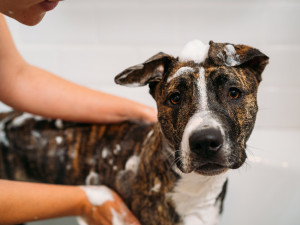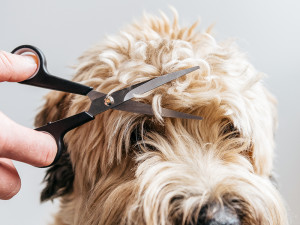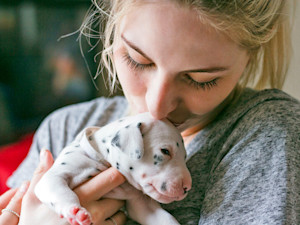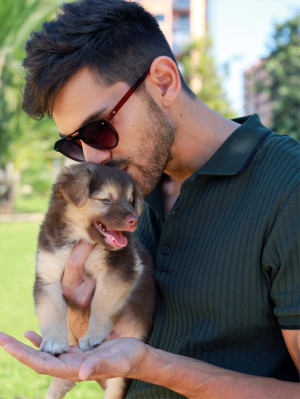Can You Give a 2-Week-Old Puppy a Bath?
How to spot-clean them instead.

Share Article
In This Article:
When Can You Bathe a Newborn Puppy? How to Clean a Newborn Puppy Without Bathing Alternatives to Full Puppy Baths Puppy Bath Health and Safety Considerations Frequently Asked Questions
While it's generally not recommended to give a bath to a two-week-old puppy due to their vulnerability to temperature changes and inability to regulate body heat, there may be times when cleaning is necessary. In such cases, spot cleaning with a warm, damp cloth is usually the safest option.
When can you bathe a newborn puppy?
Newborn puppies typically don’t need bathing. Their mom uses tongue baths to take care of their general hygiene and potty needs (puppies need stimulation to pee and poop). Plus, at that age, they don’t make much of a mess. Their focus is to eat, sleep, and stay warm.
Newborn puppies are too young for full baths, even if their fur gets really soiled. Puppies don’t have fully functioning thermoregulatory systems until they’re four weeks old. This means they can’t keep themselves warm when exposed to cold temperatures and vice-versa. Newborn puppies are very susceptible to the cold, and they rely on their mom, littermates, and an appropriate ambient temperature to stay warm. Hypothermia (low body temperature) affects a puppy’s ability to nurse and digest milk, and it leaves them more susceptible to infection.

Many pups don’t even need full baths until they’re much older. So, when can puppies get wet? Newborn puppies can have sponge baths if truly necessary, but puppy parents should wait until their puppy is at least eight weeks old to give them full baths.
How to clean a newborn puppy without bathing
If your two-week-old puppy found themselves in a pile of poo or some other mess, they can be given a careful spot cleaning or sponge bath.
Spot-cleaning your puppy
If your newborn puppy is dirty in only one area, like their paws, spot-cleaning is the way to go. Gather a washcloth and a towel. Dampen (don’t saturate) the washcloth with warm water and use it to gently wipe the dirty parts of the puppy. Don’t rub vigorously, let the dampness of the washcloth loosen any crusty debris.
Have a warm, dry towel ready to wrap the puppy while you spot dry and parts of them that got damp. Make sure your puppy gets completely dry.
Sponge-bathing your puppy
If your newborn puppy managed to roll in the entire litter’s mess, a full sponge bath may be in order. Similarly to spot bathing, you’ll want to gather a washcloth and a couple warm towels. Be sure to give your puppy a sponge bath in a room with a warm ambient temperature.
Again, dampen (don’t saturate) the wash cloth with warm water and use it to gently wipe your puppy from head to tail. Unless specifically instructed to do so by your veterinarian, do not use any soap or shampoo. Even human baby shampoo can be too harsh for a two-week-old puppy’s skin. Instead, opt for a warm washcloth and gentle massage.
Gently towel-dry the puppy with a warm, dry towel (like, recently-out-the-dryer warm). Have more than one towel handy so that you can change them out when one towel gets too damp. Make sure that your puppy is dry and warm before returning them to their mom.
Depending on the environment, the puppy may benefit from a little additional warmth after their sponge bath. Place a heating pad under half of their box or bedding. Make sure there are layers of bedding between the heating pad and the puppy (direct contact can be too hot). Placing the heating pad under only half of their bedding gives mom and pups a chance to wriggle away if it starts getting too warm.
Alternatives to full puppy baths
Small messes don’t require full sponge-baths, and puppies can benefit from early handling to learn that grooming doesn’t have to be stress-inducing. Possible alternatives to puppy baths include:
Soft brushing: Depending on the puppy’s fur type and length, gentle brushing with a soft brush can help clear the coat of crusties and help keep it clean.
Gentle wipes: Unscented wipes that are safe for puppies can be used for light messes. Keep in mind that the puppy’s mom is still cleaning and licking the puppy, so it’s best to stick with sponge baths with plain water.
Puppy bath health and safety considerations
There’s a delicate balance to reach between keeping a puppy clean and safe from infection and risking hypothermia or harm with bathing. Here are things to keep in mind to keep your puppy safe while bathing:
Protect the eyes and ears
A two-week-old puppy’s eyes and ears are in the process of opening. Take care not to expose them to soiled water.
Protect the nose and mouth
Newborn puppies are not equipped with the reflexes to protect their airways. Water in the nose or mouth can lead to aspiration (water going down the wrong tube) and pneumonia.
Recognize the signs of distress
The stress of a bath can be catastrophic for a puppy that’s already having a hard time. Signs that a puppy is failing to thrive or in distress include:
Lethargy
No interest in nursing
Inability to latch or suckle
Constant vocalization
Pale or blue gums
Be sure to keep them warm
Newborn puppies are very sensitive to cold, and getting them wet makes them even more susceptible to hypothermia. Be sure to take measures to keep them warm throughout the bathing process.
Avoid overdoing it with heat support
While it's important to keep your puppy warm, excessive heat can also be harmful. Avoid exposing your puppy to excessive heat. Don’t place them directly on heating pads or use hot blow dryers.
When to consult a veterinarian about hygiene issues
Newborn puppies can get skin infections and parasites. If mom has fleas, the puppy will get fleas, too. The best bet is to focus on prevention by making sure mom is on safe and appropriate flea prevention.
If the fleas are already there, contact your vet instead of trying to figure out how to bathe a newborn puppy with fleas. Flea products and flea shampoos are not made for young puppies, and many products are not safe if the puppies are under a certain age or body weight. Talk to your vet to determine the best way to protect mom, the litter, and your home.
Other hygiene issues that warrant veterinary attention include:
Constant diarrhea
Poor appetite
Signs of skin infection, like bumps and scabs
Maternal neglect
FAQs (People also ask):
How to groom your new puppy?
To groom your new puppy at home, gather the right tools, like puppy shampoo, towels, and treats. Give lots of praise and rinse and dry them thoroughly. If opting for professional grooming, wait until your pup is 16-weeks-old and fully vaccinated.
How often should you groom your dog?
How often a dog should be groomed depends on their coat type, fur length, lifestyle (time spent outside), and if they have underlying skin conditions. Every dog is different, but many dogs can benefit from getting groomed every three to six weeks.
How soon can you bathe a newborn puppy?
Newborn puppies should not receive full baths due to the risk of hypothermia. Instead, give a spot bath or sponge bath with a wash cloth dampened with warm water. Be sure to dry the puppy thoroughly and keep them warm during and after cleaning them.
References:

Dr. Alycia Washington, DVM, MS
Alycia Washington is a small-animal emergency veterinarian with over 10 years of experience based in North Carolina. She works as a relief veterinarianopens in new tab and provides services to numerous emergency and specialty hospitals. She also works as a veterinary writer with a focus on educating pet parents.
Related articles
When Can Puppies Eat Wet Food?
When Can Puppies Drink Water?
And why it’s so important to keep them hydrated.
![Woman kissing her small Dalmatian puppy.]()
Best Dewormer for Puppies
Not everything about caring for a puppy is cute—but unfortunately necessary.
How Long Does It Take to Potty Train a Puppy?
If anything requires patience, it’s this.
How Long Can Puppies Hold Their Pee?
You shouldn’t make them cross their legs for long!
When Can a Puppy Get a Rabies Shot?
And what you should expect after they receive it.











